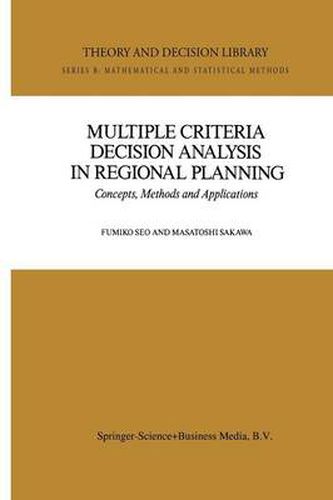Readings Newsletter
Become a Readings Member to make your shopping experience even easier.
Sign in or sign up for free!
You’re not far away from qualifying for FREE standard shipping within Australia
You’ve qualified for FREE standard shipping within Australia
The cart is loading…






This title is printed to order. This book may have been self-published. If so, we cannot guarantee the quality of the content. In the main most books will have gone through the editing process however some may not. We therefore suggest that you be aware of this before ordering this book. If in doubt check either the author or publisher’s details as we are unable to accept any returns unless they are faulty. Please contact us if you have any questions.
This book is devoted to presenting theoretical fundamentals for the methods of multiple criteria decision making (MCDM) in the social sciences with particular intent to their applicability to real-world decision making. The main characteristics of the complex problems facing humans in the world today are multidimensional and have multiple objecti ves; they are large-scale, and have nonconimensura te and conflicting objectives, such as economic, environmental, societal, technical, and aesthetic ones. The authors intend to establish basic concepts for treating these complex problems and to present methodological discussions for MCDM with some applications to administrative, or regional, planning. MCDM is composed of two phases: analytical and judgmental. In this book, we intend to consolidate these two phases and to present integrated methodologies for manipulating them with particular interest in managerial decision making, which has not yet been properly treated in spite of its urgent necessi ty. Al though a number of books in MCDM fields have already been published in recent years, most of them have mainly trea ted one aspect of MCDM. Our work specifically intends to trea t the methodology in unified systems and to construct a conceptual structure with special regards to the intrinsic properties of MCDM and its economic meanings from the social scientific point of view.
$9.00 standard shipping within Australia
FREE standard shipping within Australia for orders over $100.00
Express & International shipping calculated at checkout
This title is printed to order. This book may have been self-published. If so, we cannot guarantee the quality of the content. In the main most books will have gone through the editing process however some may not. We therefore suggest that you be aware of this before ordering this book. If in doubt check either the author or publisher’s details as we are unable to accept any returns unless they are faulty. Please contact us if you have any questions.
This book is devoted to presenting theoretical fundamentals for the methods of multiple criteria decision making (MCDM) in the social sciences with particular intent to their applicability to real-world decision making. The main characteristics of the complex problems facing humans in the world today are multidimensional and have multiple objecti ves; they are large-scale, and have nonconimensura te and conflicting objectives, such as economic, environmental, societal, technical, and aesthetic ones. The authors intend to establish basic concepts for treating these complex problems and to present methodological discussions for MCDM with some applications to administrative, or regional, planning. MCDM is composed of two phases: analytical and judgmental. In this book, we intend to consolidate these two phases and to present integrated methodologies for manipulating them with particular interest in managerial decision making, which has not yet been properly treated in spite of its urgent necessi ty. Al though a number of books in MCDM fields have already been published in recent years, most of them have mainly trea ted one aspect of MCDM. Our work specifically intends to trea t the methodology in unified systems and to construct a conceptual structure with special regards to the intrinsic properties of MCDM and its economic meanings from the social scientific point of view.